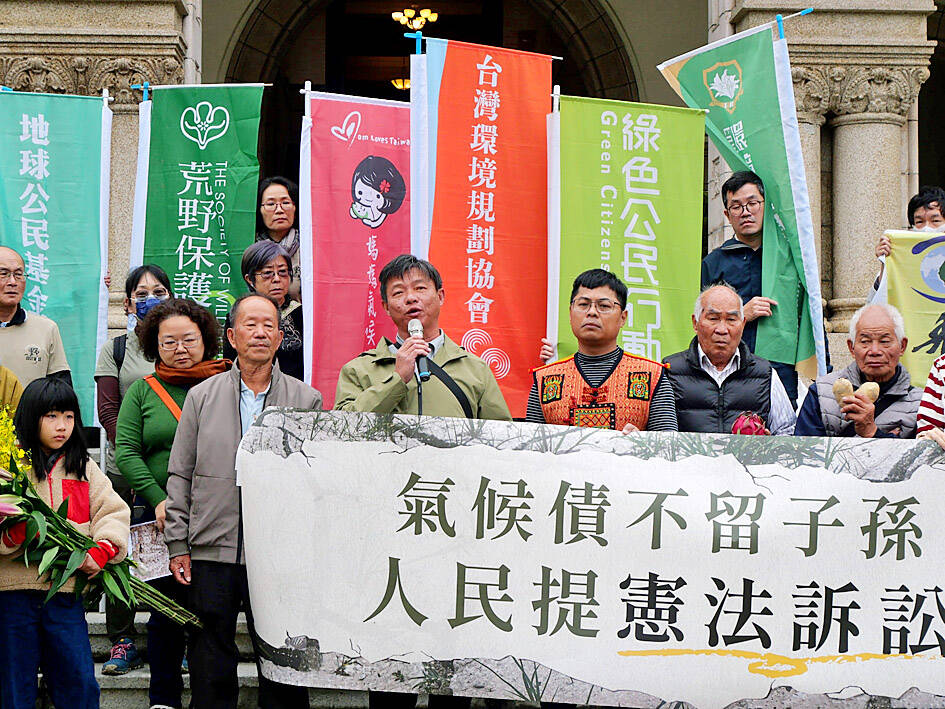Environmental groups yesterday petitioned the Constitutional Court to push the government to take more action on “intergenerational climate justice.”
Huang Hsin-wen (黃馨雯), an attorney with the Environmental Rights Foundation, said that although the Climate Change Response Act (氣候變遷因應法) was passed last year, it does not include short and medium-term national periodic regulatory goals for reducing greenhouse gas emissions.
Lawmakers also failed to clarify the standards for setting goals before passing responsibility to the Ministry of Environment, she said.

Photo courtesy of the Environmental Rights Foundation
“As the Constitution states that legislators are obligated to protect people’s basic rights, we believe that the lawmakers’ dereliction of duty has violated the Constitution,” Huang said.
The ministry has also failed by “simply asking government bodies how much greenhouse gas they were able to reduce, rather than telling them how much they should reduce,” she said.
The ministry also failed to announce third-stage regulatory goals, which the act stipulates should be set two years ahead of the beginning of the next five-year stage, or by Jan. 1, she said.
“The goal for the third stage — which runs from 2026 to 2030 — according to the act should have been set in 2024, which we understood meant Jan. 1, but the ministry claimed that the it would be in compliance if the goal is set by the end of the year,” Huang said.
The goals set in January 2018 for the first period from 2016 to 2020 and in September 2021 for 2021 to 2025 called for 2 percent and 10 percent reductions respectively against greenhouse gas emissions compared with the base year of 2005.
While the ministry has not made an announcement regarding the third-stage goal, the National Development Council in December 2022 said that it would be a 23 to 25 percent reduction.
However, the groups yesterday said that the third-stage proposal was “far too short on ambition.”
Foundation chief executive officer Tu You-wen said that the “unambitious” government goal would create a greater climate crisis for future generations.
The groups lodged the petition because they are “counting on the judicial branch, as the legislative and executive branches are overly passive about climate action.”
At a separate event, Minister of Environment Shieu Fuh-sheng (薛富盛) said that discussions on the third-stage goals were progressing as scheduled.
The goals had to be practical and achievable, while taking the realities faced by Taiwanese industries into consideration, Shieu said.

A strong continental cold air mass is to bring pollutants to Taiwan from tomorrow, the Ministry of Environment said today, as it issued an “orange” air quality alert for most of the country. All of Taiwan except for Hualien and Taitung counties is to be under an “orange” air quality alert tomorrow, indicating air quality that is unhealthy for sensitive groups. In China, areas from Shandong to Shanghai have been enveloped in haze since Saturday, the ministry said in a news release. Yesterday, hourly concentrations of PM2.5 in these areas ranged from 65 to 160 micrograms per cubic meter (mg/m³), and pollutants were

Taiwan’s armed forces have established response protocols for a wide range of sudden contingencies, including the “Wan Chun Plan” to protect the head of state, the Ministry of Defense (MND) said today. After US President Donald Trump on Saturday launched a series of airstrikes in Venezuela and kidnapped Venezuelan President Nicolas Maduro, concerns have been raised as to whether China would launch a similar “decapitation strike” on Taiwan. The armed forces regularly coordinate with relevant agencies and practice drills to ensure preparedness for a wide range of scenarios, Vice Minister of National Defense Hsu Szu-chien (徐斯儉) told reporters before a

EVA Airways on Saturday said that it had suspended a pilot and opened an investigation after he allegedly lost his temper and punched the first officer several times as their plane was taxiing before takeoff at Los Angeles International Airport. According to a report published on Thursday by The Reporter, the incident occurred after the flight’s Malaysian first officer tried to warn the Taiwanese pilot, surnamed Wen (文), that he was taxiing faster than the speed limit of 30 knots (55.6kph). After alerting the pilot several times without response, the first officer manually applied the brakes in accordance with standard operating

NOT AN OPENING: Trump’s violation of international law does not affect China’s consideration in attacking Taiwan; Beijing lacks capability, not precedent, an official said Taiwanese officials see the US’ capture of the president of Venezuela as a powerful deterrent to Beijing’s aggression and a timely reminder of the US’ ability to defeat militaries equipped with Chinese-made weapons. The strikes that toppled Venezuelan President Nicolas Maduro signaled to authoritarian leaders, including Chinese President Xi Jinping (習近平), US President Donald Trump’s willingness to use military might for international affairs core to US interests, one senior official in Taipei’s security circle said. That reassured Taiwan, the person said. Taipei has also dismissed the idea that Trump’s apparent violation of international law could embolden Beijing, said the official, who was not